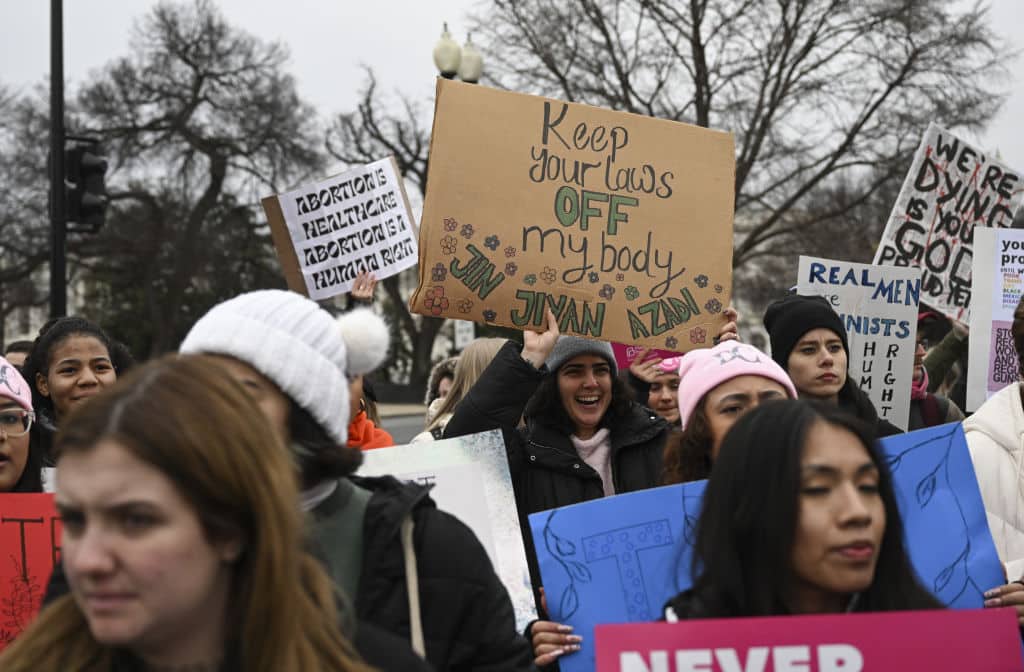TOPLINE
Mental health symptoms in the U.S. rose after the Supreme Court overturned Roe v. Wade, according to research published in JAMA on Tuesday, suggesting broader health consequences of restricting abortion access as some states continue to roll back reproductive rights.
KEY FACTS
There was an overall increase in depressive and anxiety symptoms among adults in the U.S. following the Supreme Court’s decision in Dobbs v. Jackson Women’s Health Organization, based on the peer reviewed analysis of data from the Census Bureau’s Household Pulse Survey of nearly 720,000 people.
The June 2022 decision, a draft of which was leaked in May, overturned the landmark Roe v. Wade, ending the constitutional right to an abortion and giving individual states the power to regulate or ban the procedure.
The researchers found the increase in depressive and anxiety symptoms was larger among adults living in states with trigger bans—anticipatory laws that automatically restricted access to abortion if Roe v. Wade was overturned—compared to people living in states without them.
Moreover, the researchers said this larger increase was only observed among females of reproductive age living in trigger states, with no increases in males or females who were past reproductive age.
Researchers said the data suggested these symptoms worsened when the Dobbs decision first leaked and continued to worsen after the Supreme Court’s decision was released.
Although their findings were “unsurprising” given the population-level scale of the survey and the relatively distant nature of a policy change being examined—the researchers said they were still significant and raised concerns that policies restricting abortion access could be impacting mental health on a population level.
Forbes Daily: Get our best stories, exclusive reporting and essential analysis of the day’s news in your inbox every weekday.Sign Up
By signing up, you accept and agree to our Terms of Service (including the class action waiver and arbitration provisions), and you acknowledge our Privacy Statement.
WHAT WE DON’T KNOW
The survey used self-reported mood data taken as snapshots at various points in time rather than following individuals over a long time period. This means it is hard to suggest concrete reasons why the Dobbs decision was followed by an uptick in depressive and anxiety symptoms. Researchers said the finding could potentially be explained by many factors, including fear about imminent risk of abortion denial, uncertainty on future limitations of abortion and other rights like contraception, as well as worry over the ability to receive life saving medical care during pregnancy and a “general sense of violation and powerlessness related to loss of the right to reproductive autonomy.”
KEY BACKGROUND
Health experts and practitioners, as well as a rigorous body of scientific research, have repeatedly warned that restricting access to abortion is likely to lead to mental, as well as physical, health harms. People denied abortions have worse physical and mental health outcomes, as well as worse economic outcomes. Lifesaving medicines and treatment may also be harder to acquire or deliver on account of the legal restrictions, and many abortion laws—deliberately or inadvertently—impinge upon related areas of medicine like reproductive care and fertility services like IVF. Such fears have borne out in the years following the court’s decision, including legal efforts to pull abortion drug mifepristone—which is also used to treat a range of medical conditions like miscarriages and Cushing’s syndrome and, when given off label, for issues like uterine fibroids—from the market and limiting access to reproductive healthcare and birth control. Critics of abortion often point to purported negative mental health impacts following an abortion procedure, though studies covering large numbers of people from around the world consistently reject this interpretation and find receiving a wanted abortion does not increase the risk of mental health problems like depression, anxiety or suicidal thoughts.
CONTRA
Researchers said the design of the survey did not capture the political ideology of respondents, which they acknowledged “likely plays a role in how the Dobbs decision operates on mental health” (the survey did account for state-level political ideology). It is possible that the Dobbs decision could have had a positive impact on mental health for people whose politics aligned with more restrictions on abortion access, or bans entirely.
CRUCIAL QUOTE
This research suggests that the mere existence of policies restricting abortion access—aside from the documented harms caused by the inability to access such services when desired—are associated with an uptick in mental health symptoms, wrote University of Maryland associate professor of family science Julia Steinberg in a linked editorial. The work adds to “emerging evidence” that taking away reproductive autonomy on an individual level “may increase symptoms of anxiety and depression in all people and particularly females of reproductive age,” Steinberg added, criticizing the false narrative surrounding the perceived dangers of abortion often used to drive such policies. Such “unsubstantiated” claims simply “create the veneer that legitimate scientific debate on this topic exists,” Steinberg said.
